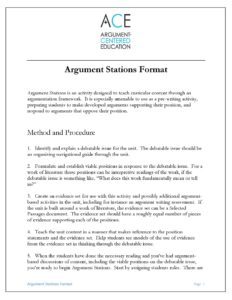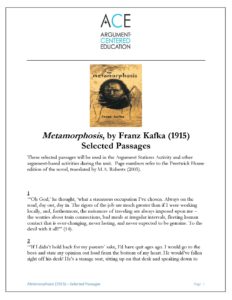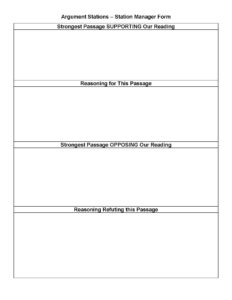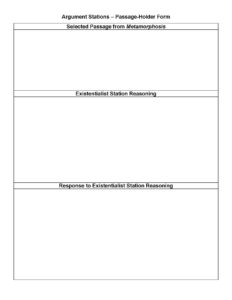
Kafka’s ‘Metamorphosis’ and Argument Stations
Only with his last glance did he see how the door of the his room had been torn open, how the mother ran out in front of the screaming sister (mother was in her underwear because the sister had undressed her to help her breathe more easily when she fainted), and how the mother then ran to the father; on her way to him, her fastened skirts slid one after another to the floor and as she tripped over the skirts, she assaulted the father and threw her arms around him, uniting wholly with him – Gregor’s sight then failed him – as she put her hands on the back of the father’s head and bade him spare Gregor’s life (48-49).
— Franz Kafka, The Metamorphosis (1915)
Metamorphosis is generally considered one of the high-water marks of the European literary Modernism. It has been baffling and mesmerizing high school and college literature students now for nearly the 100+ years since its publication.
One of Argument-Centered Education’s partner school’s English departments is in the midst of teaching this uncanny and entirely original novel, in its English III curriculum. We have collaborated on adapting a widely adaptable argument-based activity called Argument Stations. Argument Stations is an activity designed to teach curricular content through an argumentation framework. It is especially amenable to use as a pre-writing activity, preparing students to make developed arguments supporting their position, and respond to arguments that oppose their position.

Method and Procedure
(1)
Identify and explain a debatable issue for the unit. The debatable issue should be an organizing navigational guide through the unit. The debatable issue for this project is an adapted version of what amounts to a near-universal question in the context of the study of literary masterworks:
What does Franz Kafka’s Metamorphosis (1915) fundamentally mean? How should we understand the allegory of Gregor Samsa’s transformation into an insect?
(2)
Formulate and establish viable positions in response to the debatable issue. For a work of literature those positions can be interpretive readings of the work, if the debatable issue is something like, “What does this work fundamentally mean or tell us?” In the case of Metamorphosis, we generated three equally plausible interpretive positions (with an acknowledgment here to the accomplished English teacher Ira Abrams).
The Marxist Interpretive Position.
The novel is fundamentally about the way that materialist values alienate us from our true selves. We lose touch with basic human kindness, joy of life, and empathy. Even when we see the problems of materialism, our attempts to escape fail because materialism is everywhere.The attempt to escape becomes monstrous.
The Freudian Interpretive Position.
The novel is fundamentally about the anxiety and low-level mental illness that sexual repression causes in sensitive people, especially when sexuality is introduced (as it so often is) through the family. Trying to escape from forbidden sexuality, one becomes monstrous.
The Existentialist Interpretive Position.
The novel is fundamentally about the difficult choices that each individual must make in becoming an individual. The difficulty of making choices is magnified by the seeming meaninglessness of daily life in society.
(3)
Create an evidence set for use with this activity and possibly additional argument-based activities in the unit, including for instance an argument writing assessment. If the unit is built around a work of literature, the evidence set can be a Selected Passages document. The evidence set should have a roughly equal number of pieces of evidence supporting each of the positions.
The evidence set for Metamorphosis picks out six of the most salient passages in the work for each of the three interpretive positions.

(4)
Teach the unit content in a manner that makes reference to the position statements and the evidence set. Help students see models of the use of evidence from the evidence set in thinking through the debatable issue.
(5)
When the students have done the necessary reading and you’ve had argument-based discussions of content, including the viable positions on the debatable issue, you’re ready to begin Argument Stations. Start by assigning students roles. There are two roles: Station Manager and Passage Holder. Approximately 1/3 of the students should be assigned Station Manager roles and 2/3 should be assigned Passage Holder roles.
(6)
Station Managers should each receive a Station Manager Form, and they should each be assigned a position (or interpretive reading). An equal number of Station Managers should be assigned to each of the positions.

(7)
The role of the Station Manager will be to respond to the passages brought to them by the Passage Holders. They will explain to the Passage Holder that their passage supports the Station Manager’s position, using reasoning that explains how it is that the passage is supportive, or they will explain how the passage opposes their position, by supporting a competing, alternate position.
(8)
Passage Holders should each be assigned a passage from the evidence set. They should receive a Passage Holder Form. Passage Holders should take their passage and their form to a Station representing each of the viable positions. Once in front of the Station Manager they should read their passage to the Station Manager, and listen for (and take notes on, in the form) the Station Manager’s reasoning through the passage and its relationship to the SM’s position. The Passage Holder should then respond to this reasoning, agreeing with it but adding to it, disagreeing with it and offering alternative reasoning, or critiquing the reasoning in some way.

(9)
The Passage Holder should complete their form, by going around to the Stations that represent each position. The Passage Holder might need some time away from the Stations to complete their responses on the form. The Station Manager should use any down time between visits from Passage Holders to complete their form.
(10)
The activity can end with students submitting their forms. You can also conduct a discussion, either before they are submitted or after they are turned back, generated by the argumentation made in the speaking and writing that the activity required.

